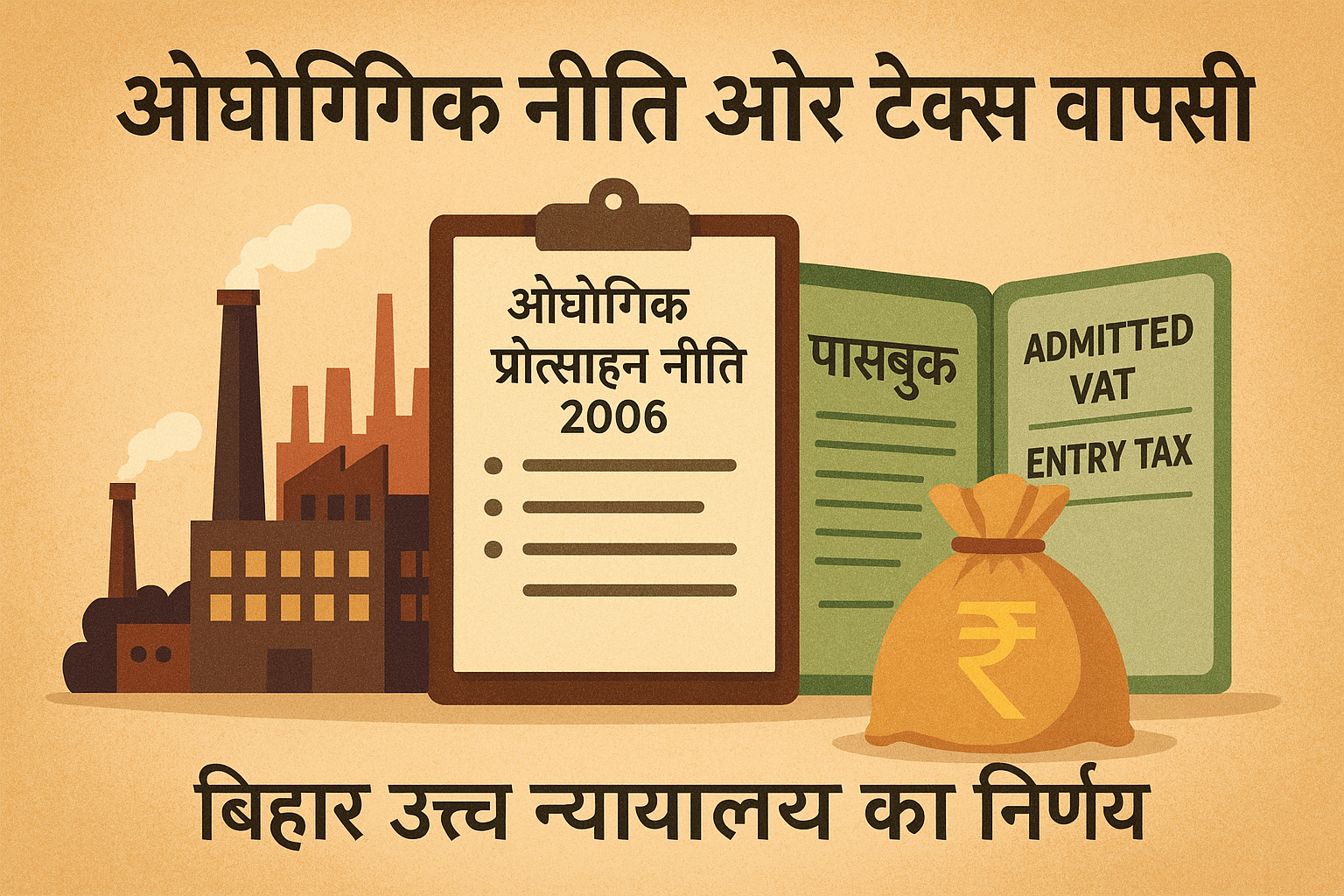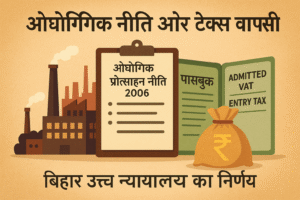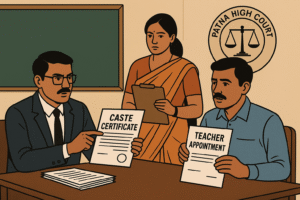Simplified Explanation of the Judgment
In this important case, the Patna High Court examined a dispute arising from the Bihar Industrial Incentive Policy, 2006, which promised tax reimbursements to promote industrial growth in the state. The petitioner, an industrial unit engaged in manufacturing steel products and industrial oxygen, approached the Court seeking direction to the State Government to release tax reimbursements (subsidy) under the said policy.
The unit had set up its factory at Bihta and started commercial production in January 2009. Under the 2006 Policy, new industries were promised 80% reimbursement of admitted VAT (Value Added Tax) for 10 years, subject to a ceiling of 300% of the capital investment. The unit had paid taxes regularly under the Bihar VAT Act, the Bihar Entry Tax Act, and the Central Sales Tax Act. However, the government delayed reimbursement, particularly excluding Entry Tax from the subsidy component.
The unit argued that this exclusion was unlawful, as the 2006 Policy and its annexures clearly treated Entry Tax as part of “admitted VAT”. The State, on the other hand, claimed that the Industrial Policy only allowed reimbursement of VAT, not Entry Tax.
Key Background of the Policy
The Bihar Industrial Incentive Policy, 2006 was notified in the State Gazette on 25 July 2006 to attract investment by offering various post-production benefits. Clause 2(vi) of the Policy stated that industrial units would receive reimbursement of 80% of the admitted VAT deposited with the government. The clarification clause and Annexure III of the Policy, however, extended this to include taxes paid under the Bihar VAT Act, the Central Sales Tax Act, and the Bihar Entry Tax Act.
The Policy also prescribed a Passbook format where tax details had to be entered and verified by the Commercial Taxes Department. The format contained specific columns for all three Acts — VAT, CST, and Entry Tax — confirming that Entry Tax was included in the calculation of the admitted VAT amount eligible for subsidy.
The Dispute
In 2007, the Commissioner of Commercial Taxes unilaterally modified the passbook format by removing the Entry Tax column — without cabinet approval or gazette notification. This administrative act effectively reduced the benefit to industries by excluding Entry Tax reimbursement.
The industrial unit challenged this modification, contending that:
- The Industrial Policy was a cabinet-approved policy and could not be altered by a departmental memo.
- The term “admitted VAT” in the Policy included Entry Tax, as shown in Annexure III and the clarification note.
- The exclusion of Entry Tax without cabinet approval violated the doctrine of promissory estoppel — since industries had invested based on the government’s original promise of comprehensive tax reimbursement.
The State defended the action, arguing that Entry Tax and VAT were separate levies, and that reimbursement was confined to VAT.
Court’s Analysis
Hon’ble Justice Mohit Kumar Shah analyzed the entire Industrial Incentive Policy, 2006, along with its annexures, prior policies, and relevant judgments of the Patna High Court and Supreme Court. The Court held that:
- The Policy document and its annexures must be read together. Annexure III, which contained the Passbook format, was part of the gazetted notification and therefore had legal force.
- Clause 2(vi) of the Policy referred to “admitted VAT” in a generic sense, and the accompanying clarification explicitly extended the benefit to taxes under the Bihar VAT Act, Central Sales Tax Act, and Bihar Entry Tax Act.
- The Commissioner of Commercial Taxes had no authority to alter the policy approved by the Cabinet. The modification of the passbook format through Memo No. 188 dated 31.09.2007 was illegal, having not been approved by the Council of Ministers or published in the gazette.
- Since Entry Tax payments were recorded under “admitted VAT” in statutory tax return forms (RT-I and RT-III), it was clear that the Entry Tax component formed part of the VAT structure. Hence, it should be reimbursed as part of the same incentive.
The Court also relied on earlier precedents such as M/s Suprabhat Steel Ltd. v. State of Bihar (1995) and other judgments where similar industrial policies were interpreted liberally in favor of promoting industrialization.
The Court’s Decision
The Patna High Court allowed the writ petition, holding that the industrial unit was entitled to reimbursement of Entry Tax as part of the “admitted VAT” subsidy under the 2006 Policy. The Court directed the State Government to release the due subsidy amount and transfer the funds to the Sales Tax Department for payment to the petitioner.
The Court emphasized that government policies cannot be diluted or modified by departmental actions unless the same procedure (Cabinet approval and gazette publication) is followed. It reaffirmed that industrial policies must be interpreted liberally to uphold the purpose of attracting investment and sustaining industry in Bihar.
Significance or Implication of the Judgment
This judgment carries substantial significance for industries operating in Bihar under government incentive schemes. It reinforces several key principles:
- Policy integrity: Once a State policy is approved by the Cabinet and notified in the gazette, no administrative department can alter it unilaterally.
- Investor protection: The judgment upholds the principle of promissory estoppel, ensuring that investors are not deprived of promised benefits after making substantial investments.
- Broader interpretation of incentives: The Court’s liberal interpretation — treating Entry Tax as part of admitted VAT — ensures that industries receive the full benefit intended by the State’s industrial policy.
- Administrative accountability: Departments must follow due process and obtain proper approvals before amending policy instruments.
- Encouragement to industrialization: By directing immediate reimbursement, the Court restored investor confidence in Bihar’s industrial ecosystem.
For the government, the case serves as a reminder that transparency and consistency in policy implementation are essential to retain trust among industrial investors.
Legal Issue(s) Decided and the Court’s Decision with Reasoning
- Whether Entry Tax is included within “admitted VAT” under Clause 2(vi) of the Bihar Industrial Incentive Policy, 2006
- Decision: Yes. The Court held that the policy and its annexures expressly include Entry Tax within admitted VAT.
- Reasoning: The gazetted Annexure III refers to VAT, CST, and Entry Tax together; hence, reimbursement must cover all.
- Whether the Commissioner of Commercial Taxes could modify the policy format by administrative memo
- Decision: No. The modification was unauthorized and void.
- Reasoning: Only the Cabinet could amend the policy, and no such approval or gazette notification existed.
- Whether the industrial unit is entitled to reimbursement of Entry Tax
- Decision: Yes. The Court directed payment of the due subsidy including Entry Tax.
- Reasoning: The 2006 Policy’s object was to incentivize new industries; excluding Entry Tax would defeat that purpose.
Judgments Referred by Parties
- M/s Suprabhat Steel Ltd. v. State of Bihar, 1995 (2) PLJR 536 — regarding liberal interpretation of Industrial Policies.
- Other High Court rulings interpreting tax reimbursement provisions under previous industrial policies.
Judgments Relied Upon or Cited by Court
- Suprabhat Steel Ltd. v. State of Bihar (supra) — followed to hold that administrative instructions cannot override cabinet-approved policies.
- Relevant Supreme Court decisions on promissory estoppel and interpretation of government policy documents.
Case Title
Industrial Unit v. State of Bihar & Ors.
Case Number
Civil Writ Jurisdiction Case No. 2726 of 2015
Citation(s)
2021(3) PLJR 73
Coram and Names of Judges
Hon’ble Mr. Justice Mohit Kumar Shah
Names of Advocates and Who They Appeared For
For the petitioner: Mr. S.D. Sanjay, Senior Advocate; Mr. Mohit Agarwal, Mrs. Priya Gupta, Mr. Alok Kumar Agrawal, Advocates
For the respondents: Mr. Sriram Krishna, Advocate; Mr. Kumar Saurav, AC to SC-11
Link to Judgment
MTUjMjcyNiMyMDE1IzEjTg==-FxERECp8vnM=
If you found this explanation helpful and wish to stay informed about how legal developments may affect your rights in Bihar, you may consider following Samvida Law Associates for more updates.








